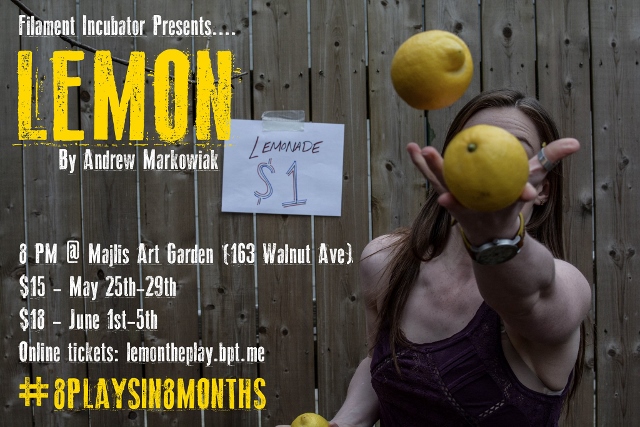Andrew Markowiak’s first play, Lemon, produced by Filament Incubator, occurs in a world where entrepreneurial spirit stands in for self-realization and everyone watches out for their own asses before anyone else’s. It’s Shark Tank as society’s organizing principle, long ago normalized and internalized at the expense of genuine (read: non-commercial) human connection.
The play follows Liz (Julia Hussey), a recent grad with no job prospects who opens up a lemonade stand on her parents’ lawn. She’s ashamed of the bottom she has to start from, still drunk off of university-fed entitlement, but it is her claim to this entitlement that allows her to carry on.
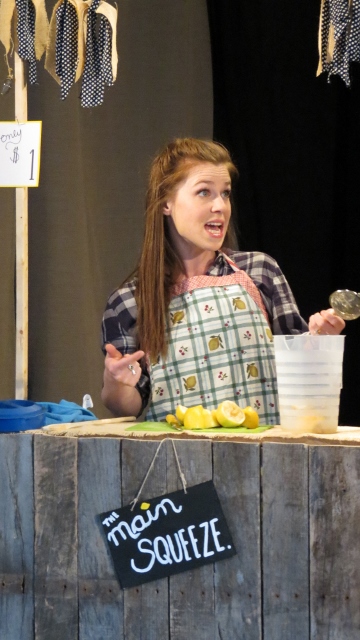
Julia Hussey. Photo by Laura Darby.
Her high school beau, Dennis (Danny Ghantous), shows up to dance around getting back together and dreams up plans to grow the stand. Ingratiating to no end, he regains Liz’s favour, mostly as a well-needed distraction from her stalled career.
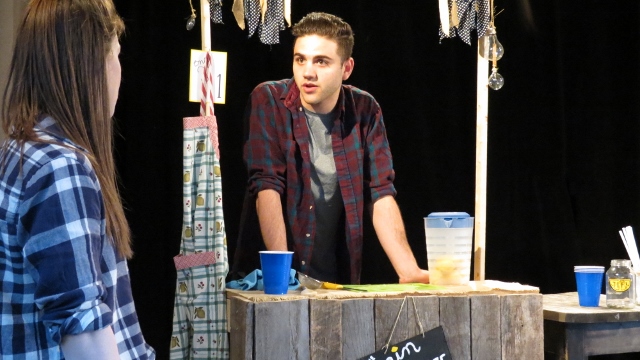
Danny Ghantous. Photo by Laura Darby.
Liz’s neighbour from around the way, Lucy (LeeAnn Ball), runs a rival lemonade outfit and is fiercely territorial. Her thuggish intimidation tactics and ice-cold, corporatist lingo are only strengthened by her being eight years old.
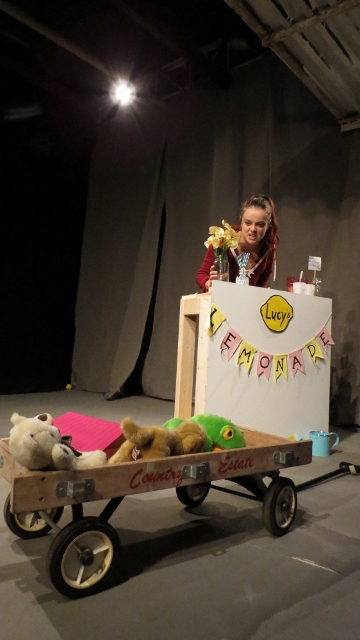
LeeAnn Ball. Photo by Laura Darby.
Lucy’s righteous paper chasing is belied by a helplessness born of her broken home. Ball’s performance is a rhythmic counterpoint of these two extremes, allowing each to be subtext one moment, front and centre the next, neither face ever settled for long. Her comfort with this flux is undeniable, irremediable, because she lets her imagination be at play. Bursts of spontaneous humanity included the squeezing of a full juice box for emphasis, the hurling of cracker crumbs deep into the audience, and ventriloquist-tight discussions with stuffed animals, her lemonade stand’s board of directors being composed of them in its entirety.
As a twenty-something hell bent on “not letting myself succumb to mediocrity,” Hussey’s is a stubborn Type-A persona built on a fear of failure, or to put it differently, a lack of experience. She’s malleable to her environment in ways beyond her control, the privileged sense of hard work always paying off her only insurance. Liz’s loss of innocence, delivered through her final business decision, though financially mature, leaves open the idea that loneliness isn’t a necessary condition for being on top. There’s hope and delight in this.
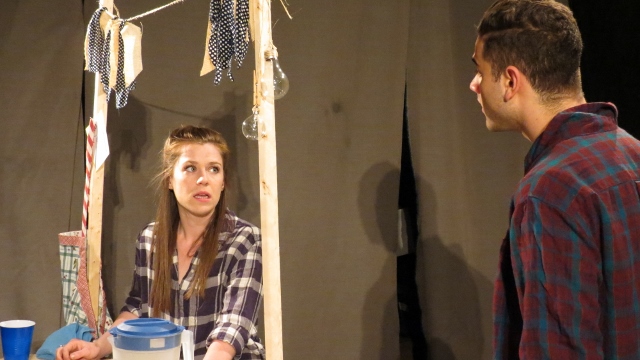
Julia Hussey and Danny Ghantous. Photo by Laura Darby.
The fascinating thing about Dennis is that, although he’s the only one looking to be a better person, he still expects to be rewarded for it. He’s the seed of his own destruction by not having the self-worth to walk away from Liz and Lucy content with the warmth in his heart. It is inconceivable from within his contemporary youth to imagine an act of kindness that isn’t tied to some pragmatic end. Even so, Ghantous and Markowiak are astute in presenting Dennis’ act of charity, in the form of his secrecy regarding his past business dealings, as unhelpful because it’s done to spare Liz from emotional distress. Her lack of hardship and having to rise above it is what has her flailing rather than striving toward independence.
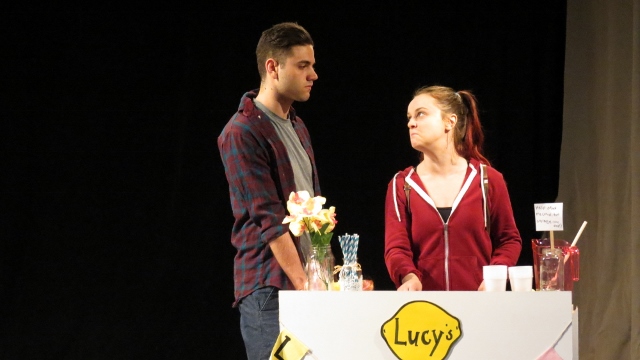
LeeAnn Ball and Danny Ghantous. Photo by Laura Darby.
Markowiak’s tragicomic script sluices humanity from a capitalist free-for-all, though at times it indulges in an earnestness about its intentions that’s already implied. He is otherwise a stylist committed to a poetic plane and a taste for detail. His dialogue, especially the initial exchanges between Liz and Dennis, is Aaron-Sorkin dense. Regarding Lucy’s age, he drops it in for a dash of the absurd only after her confidence and advanced vocabulary have fooled us into thinking her middle-aged again. Lucy’s parable of survival — “Let us not be pigeons! Let us be raccoons!” — folds elegantly into her fondness for her stuffies. It’s the accumulation of these measured touches, too numerous to describe, that show Lemon to be a personal and purposeful appraisal of how to sustain a young adult life.
Lemon runs at Majlis Art Garden May 25-29 and June 1-5, 2016 at 8 p.m. Purchase tickets here.

Photo by Sandro Pehar Photography.
Trevor Abes is a poet and arts writer living in Toronto, Canada. He was part of the winning ensemble at the 2015 SLAMtario Spoken Word Festival, and competed at both the National Poetry Slam and the Canadian Festival of Spoken Word as part of the Toronto Poetry Slam team. His work has appeared in Hart House Review, The Rusty Toque, Torontoist and untethered, among others. You can follow him on Twitter @TrevorAbes.
